

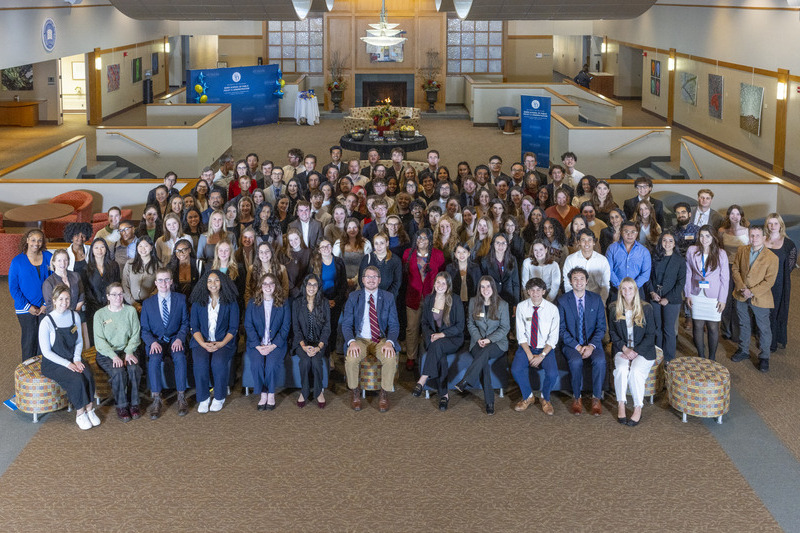
Creating third spaces on college campuses
Photos by Maria Errico November 14, 2025
Fall 2025 marks the fifth installment of national civil discourse event hosted for college students
Over 130 students, faculty and staff from across the United States were welcomed to the First State for the fifth annual Stavros Niarchos Foundation (SNF) Ithaca Initiative National Student Dialogue hosted by the Joseph R. Biden, Jr. School of Public Policy and Administration at the University of Delaware on Oct. 17-18 at the Newark campus.
A chock-full agenda included a case study presentation led by SNF Ithaca Student Leaders, a one-on-one discussion between Timothy Shaffer, the Stavros Niarchos Foundation (SNF) Chair of Civil Discourse and SNF Ithaca Director, and Stuart Comstock-Gay, president and CEO of the Delaware Community Foundation, and a student panel with participants from six of the participating colleges and universities.
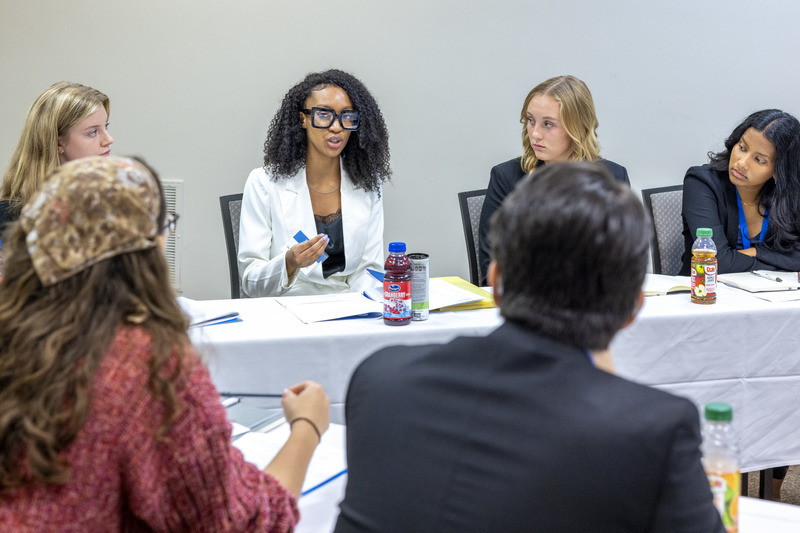
The heart of the dialogue? Dialogue
What do you most fervently believe or know to be true, and what would it take for you to change your mind? What are you deeply committed to, and what would it take to be open to change?
These were just a few questions presented at the weekend-long event.
Throughout the two days, students from 54 colleges and universities convened for breakout room sessions focusing on specific issues, including conflicting political views, self-censorship, viewpoint diversity, belonging and free speech. These small groups of students, supported by a faculty facilitator, explored issues aimed at creating “third spaces” within the campus environment to address them.
While each year’s event is intentionally designed to infuse topical elements and current events, this year’s program felt especially timely and necessary.
“Engaging in this conversation helps to demonstrate the commitment that you all have to seeing a better version of our democracy. A commitment that is bigger than any one of us, but is important for every one of us,” said Biden School interim dean Joseph Trainor during welcome remarks.
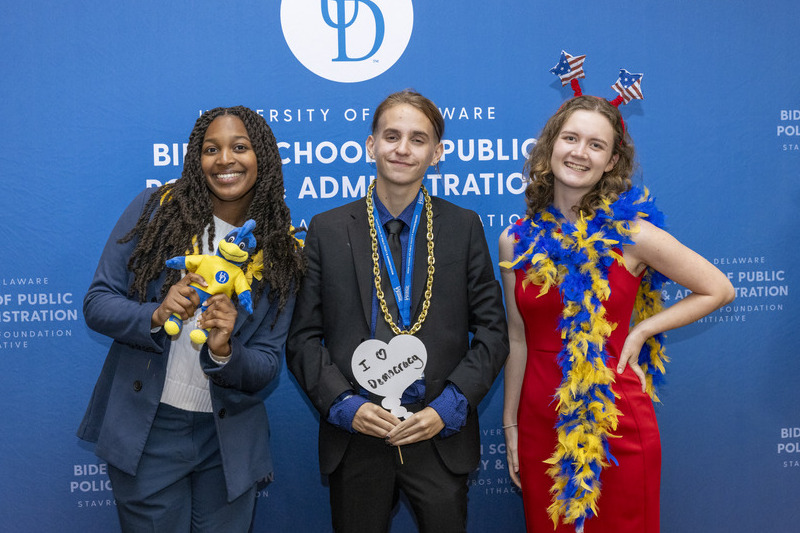
“The skills and habits that make democracy tick — participating in civic life in an informed way, considering the perspectives of our fellow citizens, contributing to collaborative decision-making — all rely at a fundamental level on our ability to engage in productive and civil dialogue,” said SNF Co-President Andreas Dracopoulos. “The National Student Dialogue, where the medium is the message, helps model this sort of engagement for students who will take it home to campuses across the country and beyond, and we at SNF have been heartened to see this event grow more robust with each passing year.”
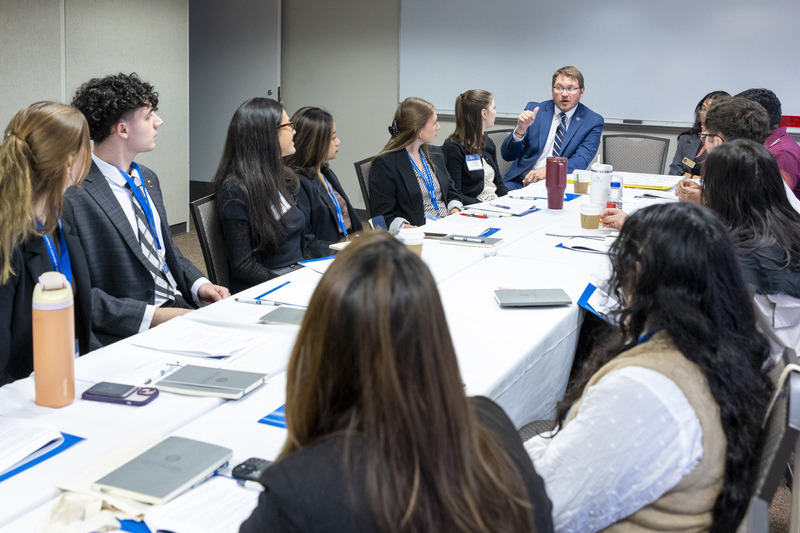
Stretch yourself
Since the event’s first iteration in 2022, interest and attendance have grown rapidly, increasing from 16 colleges and universities to 54. Its message and impact have also traveled back with students to their home campuses, as was the case two years ago with attendees from Bowling Green University who went on to use what they learned to establish the Point and Counterpoint student-run organization.
Shaffer begins each year’s program by setting the stage for what to expect from the weekend and defining civil discourse as a concept. Broadly speaking, it is what enables us to engage in productive conversations and listen to one another. While there are many ways to understand it as a concept, for the SNF Ithaca National Student Dialogue, it is presented as a tool or guide for navigating difficult conversations while maintaining and strengthening democratic values.
Shaffer guides the overall experience while sharing the stage with SNF Ithaca Affiliated Faculty Philip Barnes, who framed sessions on stakeholder mapping and workshopped solutions that helped the groups move from ideas to action.
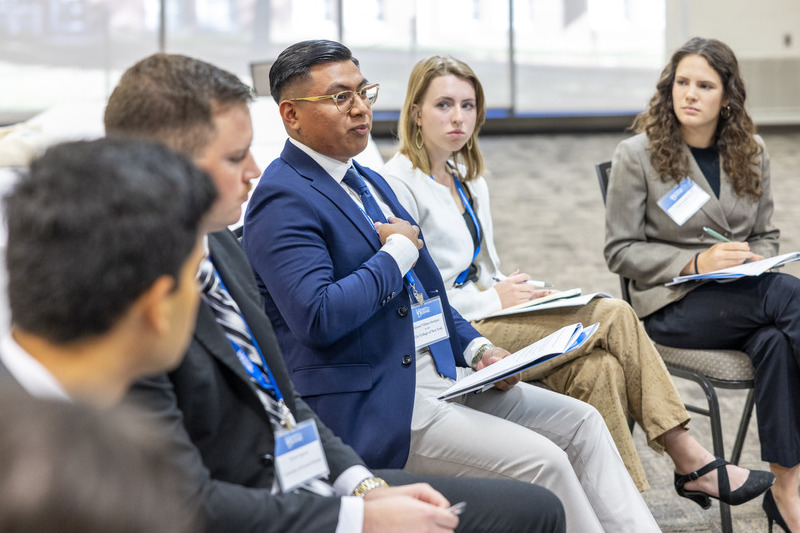
“We want to encourage you to stretch yourself. Don’t give up your values or positions, but have openness to say, ‘What else out there could give me a perspective that I hadn’t thought about?’” Shaffer prompted. “‘What is it that somebody else is dealing with — maybe in a real personal way or at their college or university — that I had not even considered?’”
Polarization does not stop at the edge of campus or remain outside of the classroom or residence hall. A deeper sense of division currently exists. So, what should we do?
Cultivating connection
An integral part of this puzzle, both at the event and year-round across UD’s campus, are the SNF Ithaca Student Leaders, a 10-student cohort that takes on leadership roles in various ways through the event. Since 2022, the program has provided UD undergraduate students from any major with the opportunity to gain expertise and experience in the interdisciplinary topics of civil discourse and civic engagement within our mediated public life. Jane Case joined SNF Ithaca in 2024 as the assistant director of the initiative, helping to guide student leaders as they spend a year immersing themselves in the theory and practice of civil discourse and civic engagement.
In addition to the National Student Dialogue, these students also play key roles in programming throughout the year, including special events and a summer internship with a government agency, non-profit organization, or another civic institution of their choice, providing an applied learning experience.
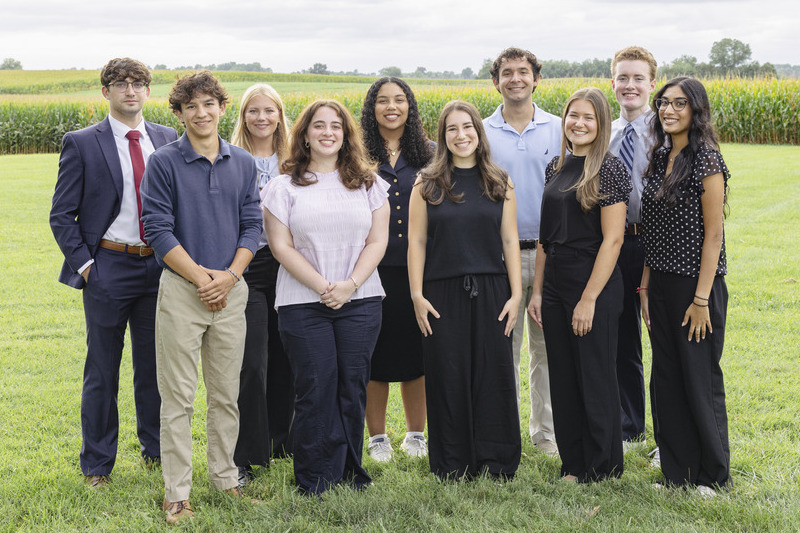
As Shaffer did with the concept of civil discourse, the leaders took ownership of exploring the opportunities and challenges of creating third spaces on college campuses during a case study presentation on the first day of the program.
Seen as separate social environments from home (“first place”) and work or the classroom (“second place”), third places are intended to foster community and connection on neutral, safe territory. On a college campus, they could look like a library, a coffee shop or a residence hall lounge.
“The National Student Dialogue gave me hope that diverse groups of people can come together to foster genuine and productive dialogue,” said student leader Suhani Mehta, a sophomore honors student studying public policy with a minor in legal studies. “Even as a student facilitator, I was inspired by the other students through their thoughtful comments on third spaces and their passion to effect change collectively.”
At the time of the event, the 2025-2026 SNF Ithaca Student Leader cohort included:
Danielle Blachar
Lauren Boyd
Pablo Charriez
Sophie Douglas
Ryan Lange
Adrianna Mazzio
Charlotte McQuillan
Suhani Mehta
Oliver Stockman
James Ziereis
The leaders have planned a variety of informal, third-space-based events called “Campus Conversations” for the academic year as a way to connect with their peers in meaningful conversations on topics such as AI and media literacy.
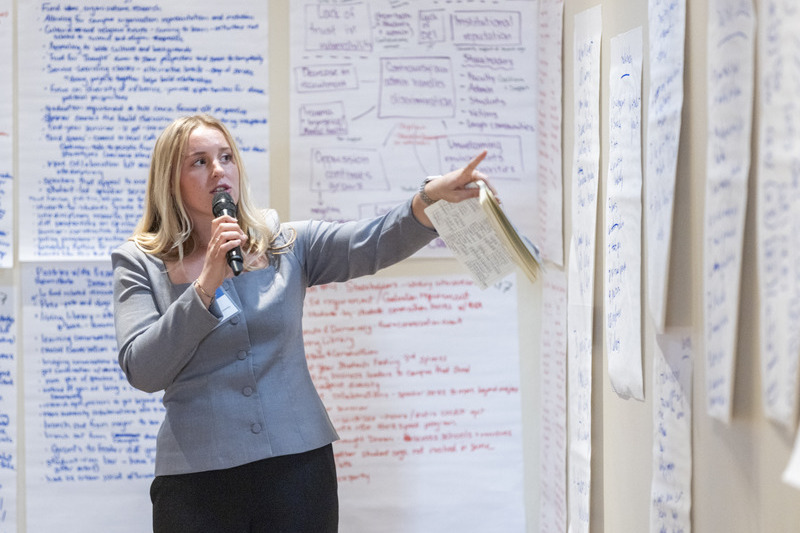
The civil discourse difference
This fall also marks the debut of the Biden School’s new flagship undergraduate degree, the Bachelor of Arts in Civic Leadership and Policy Studies. The program is designed to empower students to create positive change through effective dialogue, ethical decision-making, and innovative problem-solving while developing the civic engagement capabilities that employers and communities value.
A key component of the degree is “Citizens, Civility and Change,” a course developed and taught by Shaffer, which explores the expressions and skills of civil discourse in public policy contexts, the moveable lines between civil and uncivil behavior, and case studies of civil discourse being exercised to achieve real-world public policy change. Joining him this semester as co-teacher, as part of SNF Ithaca, is visiting assistant professor Kristie LeBeau. Previously, SNF Ithaca Affiliated Faculty Danilo Yanich also co-taught the course, which is part of the 12-credit “Citizenship and Democracy” certificate program available to all UD undergraduate students through SNF Ithaca.
To learn more about the Biden School’s SNF Ithaca Initiative and its work to unite college students in the spirit of civil and civic engagement, visit udel.edu/bidenschool/snfithaca.
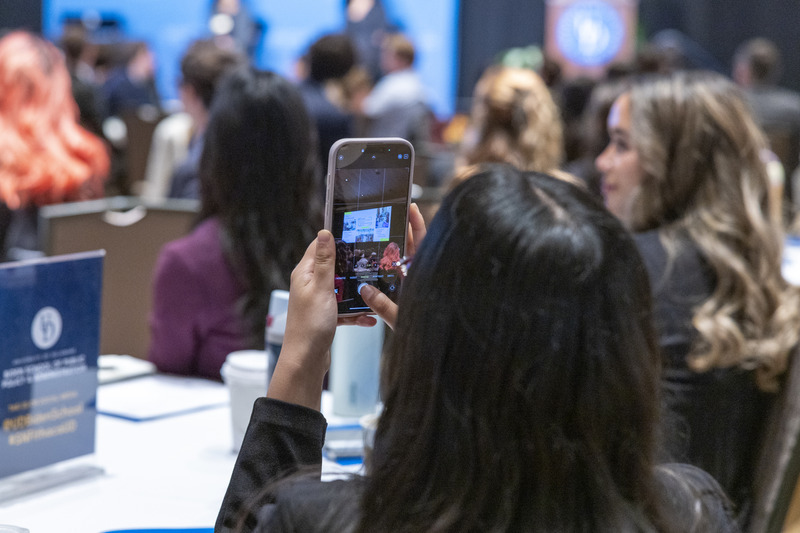
About the UD Biden School
Established in 1961 and named in 2018 for the 46th President of the United States, the Joseph R. Biden, Jr. School of Public Policy and Administration at the University of Delaware prepares students with the knowledge, skills and values necessary to engage in research and public service activities to improve the quality of life in communities around the world. Our faculty, staff, students and alumni create and use interdisciplinary, nonpartisan research and empirically based analysis to inform effective decision-making and policy and to improve leadership and administration. We partner with organizations from all sectors to discover and foster innovative and equitable solutions that promote civic virtues and democratic values.
Follow and engage with @UDBidenSchool on Facebook and Instagram and connect on LinkedIn to stay updated on the latest with research initiatives, academic activities and more.
About the SNF Ithaca Initiative
SNF Ithaca, an initiative of the University of Delaware's Joseph R. Biden, Jr. School of Public Policy & Administration, seeks to advance democracy by equipping students with the civil discourse and civic engagement skills necessary to navigate the mediated public square. Supported by the Stavros Niarchos Foundation (SNF), SNF Ithaca is named after the home of Odysseus—one of Greek mythology's greatest heroes. For Odysseus, Ithaca represents not only the beginning of a journey but the ultimate destination. Likewise, the SNF Ithaca Initiative serves as both the beginning of the Biden School students' journey toward becoming engaged and effective citizens and as the ultimate destination for students across the country to come together and work in partnership to develop policy solutions.
About the Stavros Niarchos Foundation (SNF)
The Stavros Niarchos Foundation (SNF) is one of the world's leading private, international philanthropic organizations, making grants to nonprofit organizations in the areas of arts and culture, education, health and sports, and social welfare. SNF funds organizations and projects worldwide that aim to achieve a broad, lasting, and positive impact for society at large, and exhibit strong leadership and sound management. SNF also supports projects that facilitate the formation of public-private partnerships as an effective means for serving public welfare. Since 1996, the Foundation has committed more than $3.3 billion through over 5,100 grants to nonprofit organizations in more than 135 countries around the world.
Contact Us
Have a UDaily story idea?
Contact us at ocm@udel.edu
Members of the press
Contact us at mediarelations@udel.edu or visit the Media Relations website

